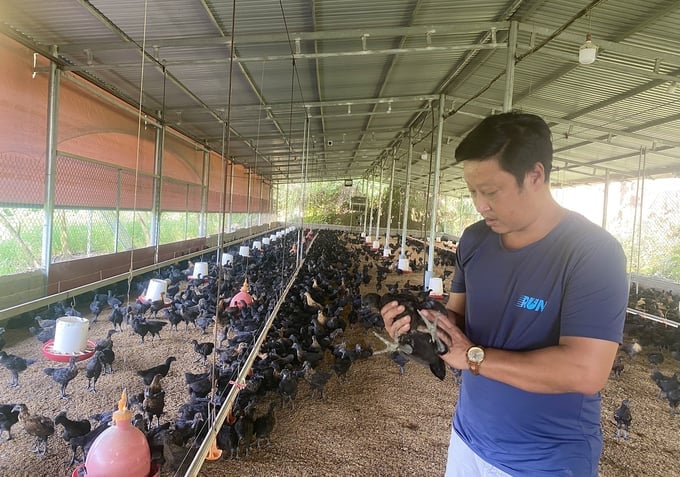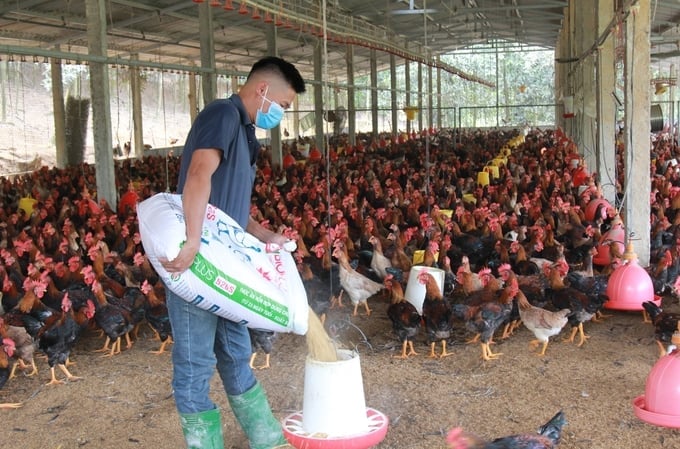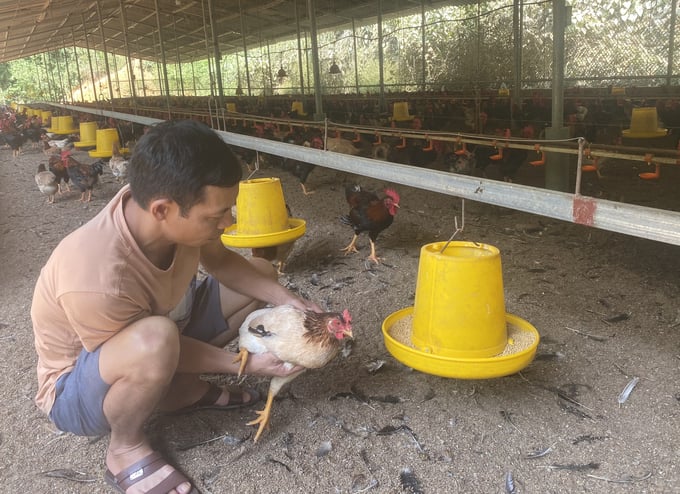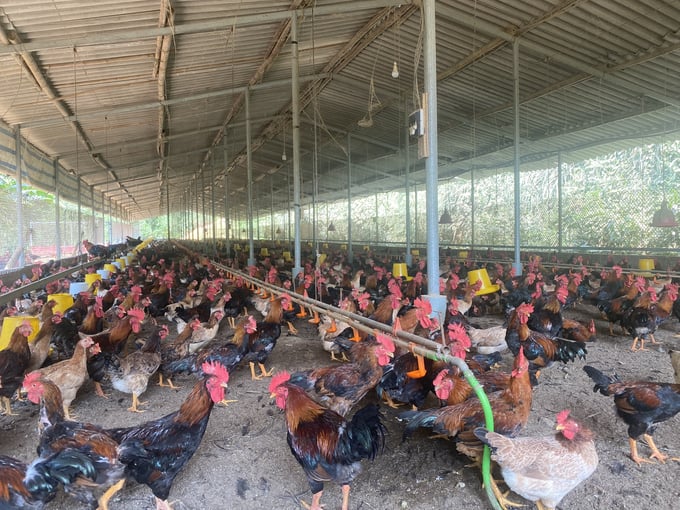June 8, 2025 | 10:19 GMT +7
June 8, 2025 | 10:19 GMT +7
Hotline: 0913.378.918
June 8, 2025 | 10:19 GMT +7
Hotline: 0913.378.918

Farmers in Yen Bai are on high alert for poultry flu epidemics to avoid risks and losses. Photo: Thanh Tien.
Mr. Nguyen Thanh Tung's family in Y Can commune, Tran Yen district, Yen Bai province has a broiler chicken farm with a scale of 10,000 chickens per batch, raising 3 batches each year. On average, his farm supplies more than 50 tons of commercial chicken to the market per year.
According to Mr. Tung, for many years, his family has devoted all its human resources and capital to raising chickens, so this is the main source of income. Mr. Tung pays special attention to disease prevention at the time of changing seasons and weather changes.
Besides regular vaccinations and choosing healthy, quality breeds, his family also regularly sprinkles lime powder, cleans the barn, and limits strangers' contact with the livestock area. He also periodically adds vitamins, ensuring enough food and water for poultry.

Regularly cleaning barns and supplementing nutrition for poultry is a solution many households apply. Photo: Thanh Tien.
MQ Livestock and Agricultural Services Cooperative in Minh Quan commune, Tran Yen district is one of the largest chicken farming cooperatives in Yen Bai. More than 30 members worked together to change small-scale production methods to linked production, biosafety and disease-safe livestock farming on a large scale.
The cooperative's livestock scale regularly maintains a herd of 150,000 chickens per batch with many chicken breeds such as Minh Du, Lac Thuy, Mong chicken, Mia chicken No. 1... Average annual revenue reaches more than VND 30 billion.
Mr. Nguyen Tien Son, Director of the Cooperative, said that farmers are most worried about disease because it will cause unpredictable damage, even total loss. Therefore, the selection of quality seed sources is always a top priority.
Spring in Yen Bai often has drizzle, prolonged humidity, and weather that easily causes many types of diseases. Therefore, every 2 times/week, cooperative members spray the entire livestock farm with biological products.
Completely vaccinate chicken flocks with all types of disease-preventing vaccines. Assign members to be on duty, monitor health, supplement vitamins, and ensure enough food and water for the chickens.

Regularly monitor the health of poultry flocks to promptly detect signs of disease. Photo: Thanh Tien.
In Yen Bai province, no outbreak of poultry flu has been detected yet. However, the province's agricultural sector has issued a document directing sectors, localities, and livestock households not to be subjective or negligent about the risk of epidemics, especially during the time of restocking after Tet.
Currently, the province's total poultry and waterfowl population is about nearly 7 million. To protect livestock activities in the area and ensure the supply of safe and quality food, on February 26, 2024, Yen Bai Department of Agriculture and Rural Development has Official Dispatch No. 277 on strengthening disease prevention and control in livestock and poultry, implementing the Month of general cleaning, disinfection and environmental disinfection, and initiate the first phase of vaccination.
Mr. Ninh Tran Phuong - Deputy Director of the Provincial Sub-Department of Livestock Production and Animal Health said that the Department has coordinated with localities and provinces, propagate and guide livestock farmers to apply biosafety farming measures, hygiene, disinfection, and disinfection to destroy pathogens.
Clinical surveillance, when detecting cases of suspected bird flu infection, reports to local authorities and specialized agencies to check and take samples for testing. In case a positive result is detected for avian influenza virus strains, it should be immediately destroyed.
It is strictly forbidden to conceal the epidemic, sell diseased poultry, spread the disease and poultry of unknown origin, or un-quarantined poultry. It is also forbidden to throw dead diseased poultry carcasses into the environment...

Yen Bai province strictly prohibits hiding the epidemic and selling infected poultry to spread the disease. Photo: Thanh Tien.
Coordinate with functional agencies such as police and market management to strengthen inspection, supervision, detection, prevention and strict handling of cases of trading and transporting poultry and poultry eggs of unknown origin, not meeting requirements on disease prevention and control, and food safety. Strictly control the import of breeds into the area.
Prepare adequate tools, supplies, vaccines, and chemicals to organize vaccination of livestock and poultry. Initiate general cleaning, and disinfection at raising facilities, hatchery, slaughterhouse, processing facilities, and the transporting and trading markets of poultry and poultry products.
Translated by Hoang Duy

(VAN) VAAS and numerous Vietnamese enterprises have signed cooperation agreements with Japanese partners to promote agricultural technology and trade connectivity.
/2025/05/29/5625-12-214801_567.jpg)
(VAN) Provincial mergers in the Mekong Delta promise to streamline administration, expand inter-provincial raw material areas, and foster close linkages in agricultural value chains, benefiting both businesses and cooperatives.

(VAN) Merging Mekong Delta provinces contributes to the expansion of agricultural raw material areas, addressing previous constraints caused by provincial boundaries. Additionally, this expansion will reduce costs and strengthen linkages between businesses, cooperatives, and farmers.
/2025/05/29/1043-2-153730_145.jpg)
(VAN) The Government's policy to merge provincial-level administrative units opens up major opportunities for the Mekong Delta region to reshape its agricultural development strategy toward large-scale production, effective regional linkages, and sustainability.

(VAN) The mutual export of agrifood products between the European Union (EU) and the United Kingdom (UK) must occur again without certification, border controls or other red tape. This was agreed at the UK-EU summit.
/2025/05/22/5121-2-173645_677.jpg)
(VAN) NBSAP Tracker identifies strengths and areas for improvement in the National Biodiversity Strategy, based on each region’s priorities and capacities.

(VAN) The draft amendment to the Circular on rice export trading stipulates a periodic reporting regime for rice exporting enterprises.